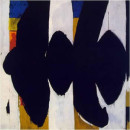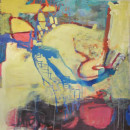The Contemporary Poem
The Contemporary Poetry Review {1} had an useful essay on the typical American contemporary poem a while back, which began with the question everyone hates to answer: When I tell people I teach and – God help me – even write poetry, they often say, “I wish you could explain modern poetry to me. I just don’t understand most of it.” Reviewing work published in the New Yorker, Jan Schreiber observes that today’s poem is commonly: * Unmetered and unrhymed. * Focused on a particular event. * Possessing slightly fantastical details, but not incomprehensible. * Inviting metaphoric or symbolic interpretation. * Reducible, with some ingenuity, to a statement, though not a simple one. * Inconclusive in its ending. Readers pointed out that New Yorker selections reflect the editors’ tastes primarily, that the examples illustrated weren’t too mind-blowing, and that...
Read MoreAmiri Baraka
In 2002, a year after 9/11, the black American poet and activist Amiri Baraka read a long poem apparently criticizing America and including questions about the Israeli intelligence warning of an impending attack on the twin towers. (1) It was in his usual no-holds-barred, in-your-face style, (2) and the poet was writing from an establishment position as the poet laureate of New Jersey. The response was loud and predictable. The Jewish community accused him of anti-Semitism, and demanded his resignation. (4) The mainstream press demonized him as anti-American. (3) The literary world distanced itself from his views, but pleaded for artistic freedom. (5) No one pointed to the obvious, that firstly the poem came close to crude pamphleteering and, secondly, there was nonetheless a pressing need for a sustained, detailed and transparent investigation into the 9/11 material that Amiri...
Read MoreColeridge and Poetry
In his popular introduction to Horace (1), L.P. Wilkinson has the task of showing how, or to what extent, the more prosaic of Horace’s odes are still poetry. By and large, the Romans were a pragmatic and unimaginative people, and Horace’s qualities – meditation, restraint, balance, tact and urbanity – are not those commonly associated with higher flights of literary creation. Even the Greeks, who urged moderation in all things, gave pride of place to passion. ‘I would confidently maintain’, says Longinus, ‘that there is no tone so lofty as that of genuine passion in the right place, when it bursts out enthusiastically as though through some kind of madness and inspiration, and fills the spoken words with frenzy’. (2) But that passion had to be held in check, restrained by economy and a faultless control of the medium....
Read MoreD.A. Powell
Douglas A. Powell rose to prominence with three collections of poems that documented the gay scene in America and the death by AIDs of well-loved friends: Tea (1998), Lunch (2000) and Cocktails (2004). The style was one he made distinctly his own (and indeed won a clutch of prizes for): long fluid lines, untitled, no capitalization, extended metaphors, double-entendres and a vibrant mix of contemporary diction that included sexual explicitness and gay talk. Take darling can you kill me: with your mickeymouse pillows from Lunch {1} it’s quieter than most poems but is often singled out for special mention. darling can you kill me: with your mickeymouse pillows when I’m a meager man. with your exhaust pipe and hose could you put me out: when I’m a mite splinter a grain a tatter a snip a sliver a whit...
Read MoreJuliana Spahr
As the author of eight books of poetry, a volume of literary criticism, and several university posts, Juliana Spahr is one of the better known of contemporary American poets. Though the term ‘political’ is applied rather vaguely -anything from being concerned with politics to being a feminist activist – a deep interest in language, sociological and ecology issues is evident in her poems, which above all aim to be accessible: ‘communal, democratic, and open process’. {1-3} I look at poems published in the Things of Each Possible Relation Hashing Against One Another (2003), {5} and This Connection of Everyone with Lungs (2005), {6-8} which illustrate these themes. Representative poems can be read on the Internet, and are discussed in Claudia Rankine and Lisa Sewell’s survey of American poetry. {9} Spahr’s open style is probably best introduced by looking at...
Read MoreSusan Wheeler’s The Debtor in the Convex Mirror
Susan Wheeler: The Debtor in the Convex Mirror.
Read MoreByron’s Don Juan
As often happens when we come across someone after the interval of many years, the old friend is just the same, with the same endearing or irritating mannerisms. Or almost the same. For sometimes we see matters a shade differently, through older eyes, as it were. So with Byron’s Don Juan, (1) which I picked up again in my old 1986 Penguin Classics paperback edition. (2) Some stanzas in Canto One copy had been ticked, I noticed, probably for some public reading or other, which I can’t now remember. These were the better stanzas, flowing together to make a continuously pleasing whole. Of the others I wasn’t now quite so sure, particularly later in the work, where Don Juan is introduced into English aristocratic society. Nothing much happens here, and though the passages were not tedious -it’s still wonderfully...
Read MorePublic Utterance
Could not poets learn from writers of editorial and political speeches to use the extended sentence construction, the swelling phrase and exact telling detail to create something individually appealing and statesmanlike – what poetry used to do well: the effective public utterance
Read MoreWalter William Landor
Walter William Landor’s achievement and his significance for today’s poetry.
Read MoreWho Reads Shelley Now?
Shelley’s star has faded: that ineffectual firebrand who got so tangled up with debts and marital irregularities that his drowning in the Gulf of Spezzia seemed almost prudential.
Read MoreMoney and Poetry
Money and poetry: parallels between the creation of money and the contemporary value of poetry: what needs to be done.
Read MoreIn Praise of Literary Criticism
Literary criticism, the dumbing down of debate and similarities with the financial institutions.
Read More









